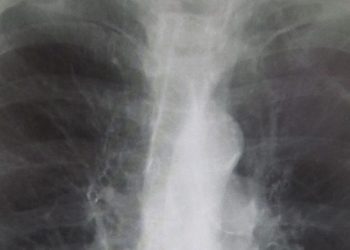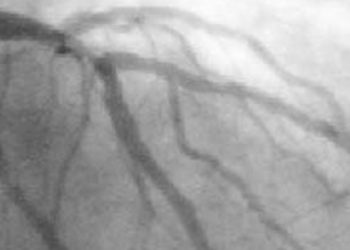Pulmonary arterial pruning and longitudinal change in percent emphysema and lung function
1. Among patients with and without COPD, a greater magnitude of pulmonary arterial pruning as measured by CT imaging was associated with a faster progression of percent emphysema as well as a faster decline in FEV1/FVC.
Evidence Level Rating: 2 (Good)
Chronic obstructive pulmonary disease (COPD), including emphysema, is a leading cause of morbidity and mortality worldwide. Additionally, a greater “percent emphysema,” or the percentage of emphysema-like lung measured on CT scan, is associated with greater lung function decline as well as mortality. It is unknown, however, if differences in pulmonary parenchymal vasculature contribute to the progression of emphysema and COPD. Therefore, this study sought to evaluate whether pulmonary artery “pruning” – as measured by the decrease in the ratio of small artery volume to the total pulmonary artery volume on CT imaging – is associated with a more rapid progression of percent emphysema and thus decline in lung function. 4,227 ever-smoking participants (mean [SD] age = 60 [9] years, 50% female) were included for analysis, 47% of whom were current smokers and 41% of whom had a diagnosis of COPD. Among study participants, median percent emphysema was 2.1% (IQR 0.6% to 6.3%). After adjusting for baseline percent emphysema and FEV1, it was found that greater pulmonary artery pruning was associated with a more rapid progression of percent emphysema (0.11% per year per SD arterial pruning, 95% CI 0.09 to 0.16) as measured by CT imaging. Pulmonary venous pruning also predicted a faster rate of percent emphysema progression, though to a lesser magnitude. Furthermore, arterial pruning was found to be associated with a faster decline in FEV1/FVC ratio (-0.04% per year per SD arterial pruning, 95% CI -0.008 to -0.001, p = 0.042), a spirometric classification used to determine the severity of airflow limitation. In all, this study suggests that greater pulmonary arterial pruning as seen on CT imaging is associated with a more rapid decline in lung function among patients with and without COPD, adding to prior data showing the importance of pulmonary vasculature in the pathogenesis and progression of emphysema and COPD.
Click to read the study in Chest
Image: PD
©2020 2 Minute Medicine, Inc. All rights reserved. No works may be reproduced without expressed written consent from 2 Minute Medicine, Inc. Inquire about licensing here. No article should be construed as medical advice and is not intended as such by the authors or by 2 Minute Medicine, Inc.






